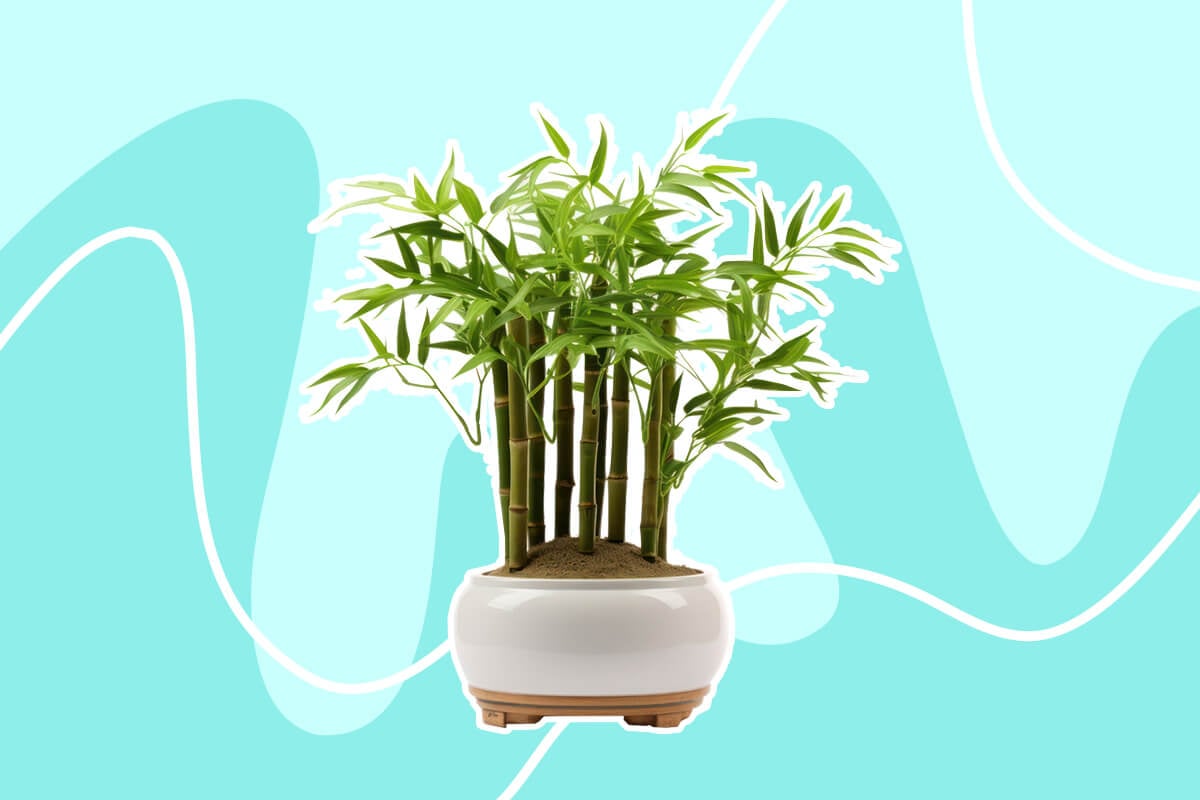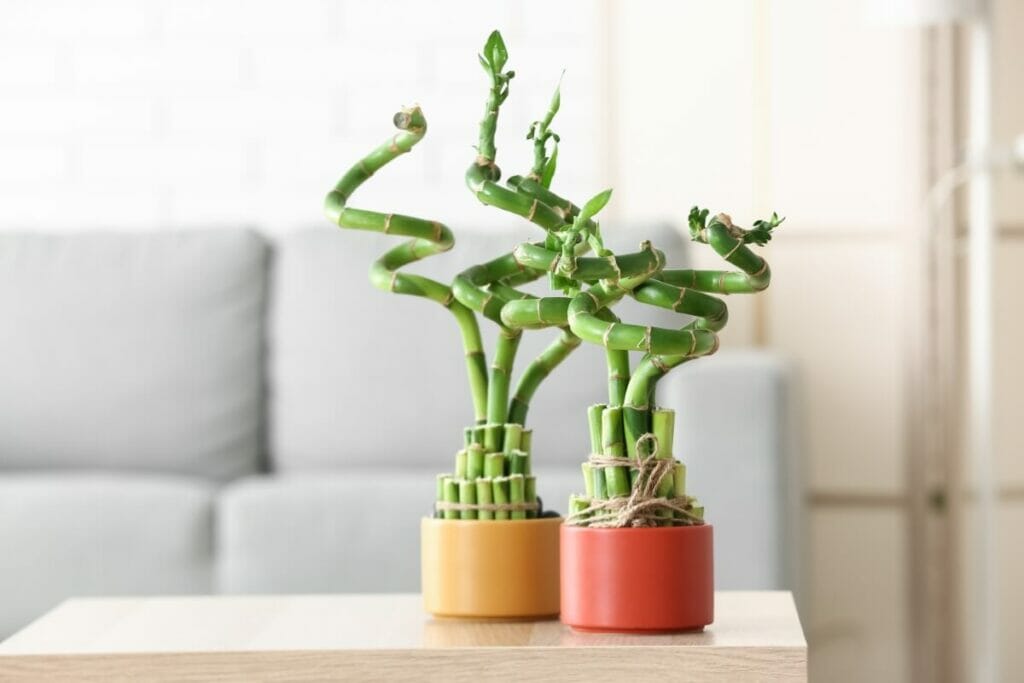Why Feng Shui Masters Swear by Lucky Bamboo — 15 Surprising Benefits Inside
Lucky bamboo plants are popular tropical houseplants with several fantastic benefits. Although primarily known for its feng shui powers, they can also help purify the air or boost productivity. In this article, I’ll explore 15 uses and benefits of lucky bamboo plants.

About Lucky Bamboo Plants
Despite its name, the lucky bamboo plant isn’t actually a true bamboo. Instead, it’s a species in the asparagus family (Asparagaceae) called Dracaena sanderiana. These plants are native to Central Africa but are also grown commercially in Asia or Europe.
Lucky bamboos are herbaceous perennials with fleshy, succulent-like stems. These stems can be trained into braided, coiled, or twisted shapes.
15 Lucky Bamboo Uses and Benefits

1) Lucky Bamboos Have a Unique Aesthetic
Lucky bamboo plants are popular thanks to their unique aesthetic. These tropical houseplants are often sold with twisted, braided, or spiraling stems, and they can even be trained into new shapes.
These houseplants achieve this architectural aesthetic thanks to their succulent-like stems. These stems can be trained by letting them grow towards the sunlight and then turning them around. After several turns, you can manipulate each stem into a desired shape.
2) Lucky Bamboo Is Great for Feng Shui
Lucky bamboos are popular thanks to their association with feng shui. As their name suggests, they are linked to good luck, prosperity, and wealth. The exact feng shui effects of a lucky bamboo plant can depend on how many stems it has.
Interestingly, they are associated with the Wood element, which is strongest in the eastern and southeastern parts of your home. Position in these areas to cultivate good feng shui.
Placing these plants in empty spaces can also increase positive energy while reducing negative energy. As such, they are some of the best feng shui plants for your home.
3) May Help Purify the Air
According to various studies, houseplants like lucky bamboo could help purify the air in our homes. These plants can absorb harmful airborne chemicals known as VOCs (volatile organic compounds). VOCs are produced by various household items such as adhesives, paint, and vinyl floors.
These chemicals have been linked to an increased risk of cancer and other health problems. NASA’s Clean Air Study found that Dracaena plants, like lucky bamboo, are good at removing VOCs like benzene and formaldehyde.
4) Are Easy to Grow
Lucky bamboo is a reasonably low-maintenance plant that is easy to grow indoors. These tropical houseplants thrive in bright, indirect light but can tolerate shade. Water your plant whenever the top inch or two of the soil feels dry.
Dracaena sanderiana plants also require warm temperatures between 65 and 90ºF. These adaptable plants can tolerate dry or humid air. Plus, they grow best in rich, well-draining soils that retain some moisture.
5) Can Be Grown in Water
Lucky bamboos can even grow them in a glass of water. Add some pebbles to the bottom and use enough water to cover the roots. Change the water once a week and add one or two drops of liquid fertilizer every couple of months. Use filtered, room-temperature water, as tap water may contain harmful chemicals.
6) Can Be Grown Outdoors
Dracaena sanderiana plants can also be grown outdoors in the right conditions. However, these tropical plants need warm, humid climates when growing outside. They can be grown outdoors in USDA Zones 10 and 11.
They require partial shade outdoors to protect them from direct afternoon sunlight. Plus, they don’t like the cold, so add a layer of mulch during the winter.
7) Easy to Propagate

Lucky bamboo is a short-lived houseplant that only lives for one to three years. Thankfully, you can propagate them easily using cuttings. This allows you to keep enjoying their feng shui benefits.
Take cuttings from your bamboo at any time of year. Choose cuttings that have at least one visible node. Place them in water and change the water every week until they develop roots. You can then plant your young cuttings in water or soil.
8) Boost Productivity and Focus
Along with promoting good luck and success, lucky bamboos could also boost your focus and productivity. As such, this plant is one of the best feng shui plants for your home office.
A study conducted in offices in the Netherlands and the UK tested whether houseplants improved productivity. The data showed that workers were approximately 15% more productive with plants nearby. The participants also felt less stressed and more engaged.
9) May Help Reduce Stress and Anxiety
Houseplants like lucky bamboos could also help reduce the stress and anxiety of modern life. One study evaluated the stress levels of 24 young men when repotting a houseplant or working at a computer.
The participants who interacted with the houseplant experienced less stress. They also felt more comfortable and more natural. The data also showed that they had lower blood pressure than those working at the computer.
10) Could Help Us Sleep Better
Having a lucky bamboo plant in your bedroom could also help you sleep better. A Chinese study measured the’ effects of plants on astronauts’ sleep patterns in long-term isolation. According to the data, participants slept better when they could see, smell, or touch nearby plants.
With plants present in their bedrooms, participants also showed lower cortisol levels. They could also regulate their central nervous systems better.
11) Lucky Bamboo Plants Are Easy to Prune
Lucky bamboo plants are easy to prune, meaning maintaining a desired shape is easy. As your bamboo grows, trim any unwanted offshoots using clean, sterile tools. Trim each offshoot back to about an inch from the stem.
The best time of year to prune is in the fall or early winter. However, you can trim them in small amounts throughout the year.
12) Are Hardy Indoor Plants
Dracaena sanderiana plants look beautiful, but they’re also reasonably tough. They tolerate both humid and dry conditions, allowing them to suit different climates. However, they still need warm temperatures.
Plus, they are pretty hardy against diseases and pests. However, watch out for pests like mealybugs, scale insects, and spider mites. Use insecticidal soap or horticultural oils to get rid of these pests.
13) Make an Excellent Office Plant
Lucky bamboo plants are perfect for your home office. These robust feng shui plants can help you cultivate good luck, prosperity, and success. Plus, they are linked to creativity and growth thanks to their association with the Wood element.
These plants can also boost productivity, reduce stress, and purify the air. These plants are also easy to grow, meaning you can focus more on your work.
14) Can Increase Household Humidity
These bamboo plants thrive in moderate to high humidity levels between 50 and 70%. As such, this can also boost ambient humidity in your home. This can be good for our health because humans require average humidity levels between 30 and 50%.
Use humidifiers or pebble trays to increase ambient humidity around your bamboo. This will also help raise the humidity in your home to healthy levels.
15) Could Help Alleviate Allergies
Lucky bamboo can purify the air within our homes by removing harmful VOCs like benzene and formaldehyde. This can also have the added effect of alleviating allergies like asthma or hay fever. The strong odors emitted by items that produce VOCs can exacerbate these allergies.
These plants are also suitable for people who suffer from hay fever. Although these tropical plants can produce flowers, there’s virtually no chance of them blooming indoors. This means that they won’t produce any pollen.
Wrapping Up
Lucky bamboo looks fantastic but also provides several impressive benefits. These bamboos are excellent feng shui plants linked with good luck and prosperity. Dracaena sanderiana plants can improve air quality, boost productivity, and even help reduce stress.
Briana holds a B.S. in Plant Sciences from Penn State University. She manages a small market garden where she grows vegetables and herbs. She also enjoys growing flowers and houseplants at home.

